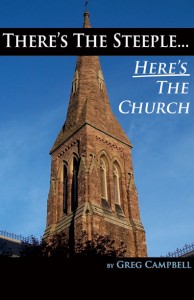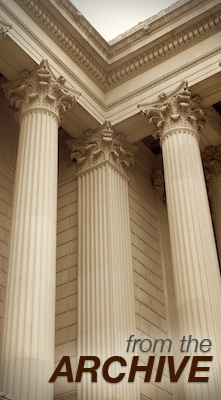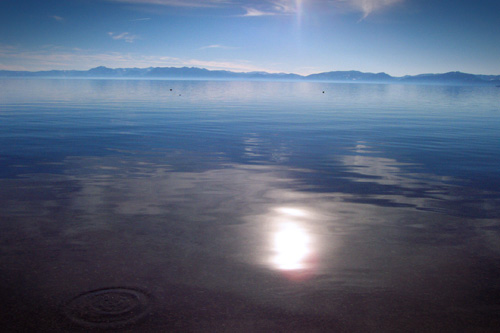 Several years ago I published a book containing much of the writing on the topic of the Church that I had published here up to that point. Those posts are still available in the archives, and many are still read on a weekly basis.
Several years ago I published a book containing much of the writing on the topic of the Church that I had published here up to that point. Those posts are still available in the archives, and many are still read on a weekly basis.
Just the other day I was flipping through a copy of this book, There’s The Steeple… Here’s The Church, (I call it “The Church Book”) and came across a chapter that had some really good thoughts that I wanted to share again.
And so that is what I’m doing here today!
This is the official book version—the chapter from the book. As such, it’s been edited, partially re-written, and should be a tad more complete than the original posting on the blog in 2005.
If you’d like to get the whole book, please click the Bookstore tab at the top of the page, and you can purchase a copy through Amazon. Thanks!
(Want to read the back cover?)
And now, “¿Saber, o Conocer?”
¿Saber, o Conocer?
Following up on the last chapter, Information Exchange, I have noticed that it seems everywhere I look, the more noble goal, the thing to most strive for in life is knowledge. We paint scientists and teachers and other fact-based professions as the most honorable, and wisest professions. And then there is our obsession with experts. As a society, we would much sooner trust a person who spent decades of their life in a classroom, than we would a person who has been a close friend for years.
Knowledge reigns supreme.
And we see this even in the church. The place where the wisdom of the world should have no hold, but in fact it does. Our entire concept of church is much more like a university than a family. In my opinion, this should not be. The church is not an educational institution. Jesus did not set up 90-minute classes offered Monday, Wednesday and Friday evenings in the Temple courts. He didn’t establish the School of Jesus, or Nazareth Christian Academy. He just loved people, and revealed truth about life through stories, and through life lived with a few close friends. You’d think if knowledge were indeed supreme, Jesus might have been more intentional about it.
Now, even a quick study of the book of Proverbs, and the Psalms, and even Ecclesiastes and Job (we call them the books of Wisdom) shows how much emphasis the people of God and God himself placed on knowledge. When you read those books, and the verses that specifically mention knowledge, it’s quite evident that knowledge is supreme over all else. It is better than the choicest gold, it will deliver the righteous, and knowledge and understanding come straight from the mouth of God. So, it’s quite obvious that God places a premium on knowledge.
But as I continued to read, one scripture after another about knowledge, something struck me. I have grown up in this culture, and so I first think of knowledge as the stuff of trivia — life deconstructed into lifeless fact and ingested and regurgitated by rows of mindless sponges soaking up so called “knowledge”. We have cheapened knowledge into what in Spanish is called Saber. (Yes, I know, that’s the verb…)
You see, in Spanish, there are two words for the verb, “To know.” (From whence cometh the noun, “Knowledge”.) The word saber means to know stuff. It means I know that my name is Greg. I know that I have three kids. I know that I live in Palmyra, NY. Yo sé. I have learned and can repeat to you those factoids.
The other word would also be translated “to know” but has an entirely different meaning, and a different use. Conocer means to know, and it is more intimate. It is how I know Jen, or my kids, or anything with which I am very familiar, especially people. Yo conozco a mi hijo, Ian. I know my son Ian.
In English, the word looks the same. I know the Bills won this weekend. I know my son, Ian. But in spanish, if I said, “Yo conozco a mi hijo, Ian” and then said, “Yo sé mi hijo Ian” — using two words that could both be translated “to know”, I would end up saying very different things. The former would convey an familiarity with Ian, that I know him personally and intimately, that we have shared life together. The latter would be more correctly translated, “I know of my son, Ian.” It is detached, informational, intellectual knowledge. Personless. Lifeless.
And that’s exactly what we have sometimes. We have switched the words and forgotten to check the meaning. When we see that we need to strive for knowledge — when we understand that knowledge is the commodity we must seek — we are thinking the kind of knowledge that is taught in classrooms. So, we set up lectures and series of lessons, and we create study guides and study Bibles and study groups, and all sorts of tools to fill our minds with the “knowledge of God.” But Paul says in his first letter to the Corinthians:
“Knowledge makes arrogant, but love edifies.”
1 Corinthians 8:1
And later, in 1 Timothy, he states:
“[avoid] worldly and empty chatter and the opposing arguments of what is falsely called ‘knowledge’”
1 Timothy 6:20
Paul knew that there were different kinds of knowledge. One that builds up and should be sought after, and one that isn’t even knowledge at all, and only serves to build up the ego of the person who possesses it.
Consider what Jesus said to a group of people who loved to learn about God and took pride in their knowledge of Him.
“You search the Scriptures because you think that in them you have eternal life; it is these that testify about Me; and you are unwilling to come to Me so that you may have life.”
John 5:39-40
Jesus points out to these guys that even though they pour through the Scriptures, and read all about the One who is life, they refuse to actually come to Him for real life. They are satisfied with “saber” God rather than “conocer” God. I happen to give them more credit than we usually do in Christian circles. It’s too easy to think of the Pharisees as ugly, grumpy old men who always walked around with a sneer on their faces, pointing and laughing at people for their spiritual inadequacies. I think they were mostly trying, but just did not understand the truth Jesus was getting at.
Jesus said, in the verse I probably quote the most of any that I know — John 17:3 — that “eternal life is to know you, the One true God, and Jesus Christ whom you have sent”. That’s it. Not know about him, or to know all the stuff he said or did, or even to know what he wants us to do. Eternal life IS to KNOW GOD. Conocer. Not saber.
Hosea said it like this:
“For I delight in loyalty rather than sacrifice, And in the knowledge of God rather than burnt offerings.”
Hosea 6:6
God doesn’t want us to know about him. He wants us to know him, and to be like him. We can never achieve that on our own, but as we hang out with him, and get to know him, it will be a natural outcome of our relationship with him. As we know him more (again, not more about him ) we will be transformed in his likeness.
At nearly every Christian wedding we hear the famous cadence of love from the thirteenth chapter of first Corinthinians. Love is this, love is that, love is not this, love is not that. But at the beginning of the famous part, Paul says very simply that if we have knowledge, but don’t have love, it’s worthless. (1 Corinthians 13:2) We say the words, but don’t heed their meaning.
I am not saying that all of our learning and information dissemination infrastructure is devoid of love. Obviously, the heart of most every Christian leader is to impart (out of love) the knowledge that they have gained of God’s insane love for us. The motive is not in question, just the method of delivery.
Perhaps in all our desire to have “knowledge” we forgot that there are two ways to “know”.
We can know about God, or we can actually know God. We can spit back facts crammed into our head in late night fact ingestion sessions, or we can breathe the familiarity that comes from daily life with our Maker. The choice seems simple to me. You get to choose how you define knowledge. You can pick what you will strive for.
So what will it be? ¿Saber, o Conocer?
This post is a chapter in the book There’s The Steeple… Here’s The Church by Greg Campbell, available through Amazon.com. If you’d like to purchase the book, please click the book title in the previous sentence. If you’d like a free PDF version, it is available here. Also have some of the audio version available at church.gregshead.net. Thanks for reading, sharing, and feel free to add to the discussion in the comments below, or wherever else you can reach me.

 I had a run-in with the law this week.
I had a run-in with the law this week. I walked next door to the Village Clerk’s office, which was then being manned (womanned?) by a friend of ours. She had heard of the alleged infraction, and knew of the license requirement, but like the officer and myself, shook her head at the enforcement of it in the case of a teenager’s lemonade stand.
I walked next door to the Village Clerk’s office, which was then being manned (womanned?) by a friend of ours. She had heard of the alleged infraction, and knew of the license requirement, but like the officer and myself, shook her head at the enforcement of it in the case of a teenager’s lemonade stand. If this worked for the Israelites (and it was God’s idea in the first place) then why wouldn’t it work for us, too?
If this worked for the Israelites (and it was God’s idea in the first place) then why wouldn’t it work for us, too? “You’re a human being, not a human doing!”
“You’re a human being, not a human doing!” Recently, I was fascinated by poop.
Recently, I was fascinated by poop.

